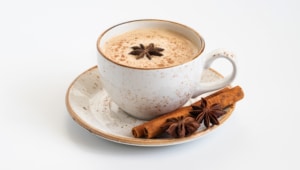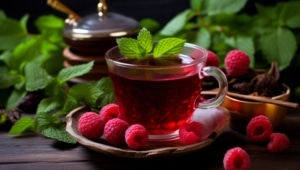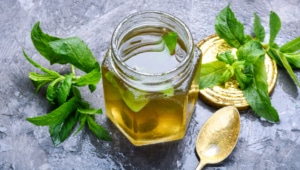7 Health Benefits of Chamomile Tea & 8 Tips

Chamomile tea is one of the most flavorful, gentle herbal infusions you can make at home. It’s fragrant, slightly sweet, and has none of the bitterness or strong flavors of green or black teas. In this article, we’ll tell you all about why you should drink chamomile tea to benefit your mind and body.
Did you know that there are two kinds of chamomile available today? This ancient herb was once considered sacred.
It’s been used to treat a variety of ailments since the 10th century, and is still a popular home remedy today. Yet there’s much more to chamomile tea than just its healing properties.
What Chamomile Tea Is: Interesting Facts

What Chamomile Tea Is: Interesting Facts
Chamomile is a daisy-like plant that has been in use to treat a range of ailments for hundreds of years now. In Hungary, chamomile is actually known as the ‘king of herbs’ for its many different uses.
Interestingly, German chamomile is also sometimes known as ‘water of youth’, and Roman chamomile is often used to create a chamomile plant-based lawn in your garden.
There are two main types of chamomile, plus a range of different subspecies you can find across the world.
The two most popular types are German chamomile, which has a stronger flavor and scent, and Roman chamomile, which is said to be sweeter and more mild in flavor.
Beyond the obvious, German chamomile is also meant to be better for treating skin problems, and Roman is more helpful for issues with your digestive system.
The name ‘chamomile’ comes from Greek, and literally means ‘ground apple’. This is because, to some, chamomile smells like apples.
You can forage pineapple weed, a cousin of the wild chamomile plant. Pineapple weed smells and tastes like pineapple with a hint of chamomile.
It offers a range of benefits much like regular types of chamomile, and can reduce symptoms of stress, improve digestion, and treat fevers and sores.
Origin and Where Chamomile Tea Comes From

Origin and Where Chamomile Tea Comes From
Chamomile appears to originate in ancient Egypt, though it’s native to Asia, Africa, and even Europe. Nowadays, it’s cultivated in temperate climates throughout the world.
Chamomile’s earliest use as natural medicine was documented in an Egyptian medical papyrus.
In Ancient Egypt chamomile was used to treat skin problems and calm fevers. The use of chamomile in tea also likely originated in these ancient times.
What Chamomile Tea Is Made Of

What Chamomile Tea Is Made Of
Chamomile tea is made from dried flowers of the two main types of chamomile – Roman chamomile and German chamomile. These are steeped in hot water, as any other type of tea, and enjoyed hot or cold.
What Chamomile Tea Tastes Like

What Chamomile Tea Tastes Like
Chamomile tea tastes floral, mellow, and a little like honey. It has a delightful natural sweetness. Some say chamomile tastes a little like fresh apples, too.
Does Chamomile Tea Have Caffeine?
Chamomile tea contains no caffeine. This is one of the reasons this tea is so naturally relaxing and helpful for your digestive system. None of the chamomile types contain caffeine.
Nutritional Facts and Calories of Chamomile Tea

Nutritional Facts and Calories of Chamomile Tea
Chamomile tea contains a range of flavonoids, minerals, and vitamins.
Some of the key vitamins and minerals include folate, calcium, carotene, potassium, magnesium, and vitamin A. It also contains trace amounts of iron and no calories.
The latter only applies when you have chamomile tea without any added milk or sugars. Most people are generally fine to have chamomile tea, with some exceptions noted below. Two to three cups are a normal limit for most.
Health Benefits of Drinking Chamomile Tea

Health Benefits of Drinking Chamomile Tea
Chamomile tea is widely enjoyed for its range of health benefits, particularly when it comes to relaxation and cold symptoms.
But did you know that chamomile tea offers many more potential benefits than just those two? Below is a list of some of the most common ailments you can use chamomile tea for.
May Have Calming Effects and Help You Sleep Better

May Have Calming Effects and Help You Sleep Better
Chamomile extract has been shown to help in a similar way to a mild sedative. Much like this, chamomile tea may be used to calm frazzled nerves, reduce symptoms of anxiety, and even aid with sleep problems.
Might Improve Health Complications Associated with Some Cancers

Might Improve Health Complications Associated with Some Cancers
Chamomile has been proven to help with a variety of side effects some cancer patients experience. It ‘s been shown to help against depression, reduce vomiting and improve appetite, and be effective against skin complications and oral mucositis.
May Help Improve Your Digestive Health
If you suffer from digestive problems, chamomile tea may be for you. It’s lauded for its effect as a digestive system relaxant, and can help with indigestion, nausea, diarrhea, and flatulence. In babies over the age of 6 months it may help treat upset tummies and gas.
Possibly Eases Symptoms Associated with PMS

Possibly Eases Symptoms Associated with PMS
Chamomile tea has anti-spasmodic properties, which are said to help with the relief of cramps.
As it’s generally good for depressive symptoms and anxiety, this herbal tea can also help with associated issues during the pre-menstrual period.
Might Alleviate Some Symptoms of Anxiety and Depression

Might Alleviate Some Symptoms of Anxiety and Depression
Herbal teas made with chamomile aren’t just relaxing, they can actually help with symptoms of anxiety and depression.
Chamomile is known to work similarly to mild tranquilizers in improving sleep.
It may also increase neurotransmitter activity in the brain, thereby boosting mood and easing anxiety.
May Reduce Complications Associated with Diabetes

May Reduce Complications Associated with Diabetes
Some studies have been conducted to investigate the relationship between chamomile tea and diabetes symptoms.
It’s been shown that chamomile tea can in fact lower blood sugar levels. It may even lower levels of oxidative stress and reduce risks of complications associated with diabetes.
Possibly Helps Fight Infections and Alleviate Cold and Flu Symptoms

Possibly Helps Fight Infections and Alleviate Cold and Flu Symptoms
Chamomile tea has been used since the Ancient Egyptians to treat skin infections. Similarly, it can alleviate and help with bacterial infections of the gums, mouth, and respiratory system.
Besides which, a warming cup of chamomile tea can relax and make you feel better when you’re under the weather.
Potential Risks

Potential Risks
As with any herbal remedy, chamomile tea may pose some potential risks.
These are generally only of concern when you have excessive amounts. With that said, some groups of people should probably avoid chamomile tea or speak to their doctor before consuming it.
Some People May Be Allergic to Chamomile

Some People May Be Allergic to Chamomile
If you’re allergic to chamomile-related plants such as daisies, marigolds, chrysanthemums, or ragweed, you may wish to steer clear of chamomile tea, too.
In rare cases people have had anaphylaxis when drinking chamomile tea, due to just such an allergy.
Too Much Chamomile Tea Could Cause Vomiting
Having too much chamomile tea may cause you to vomit, especially if it’s very concentrated. This is most likely to happen if you have a sensitive stomach to begin with.
May Make You Too Drowsy to Drive

May Make You Too Drowsy to Drive
Since chamomile tea is frequently enjoyed for its beneficial effects on sleep and anxiety, you probably shouldn’t have it before driving.
Steer clear if you’re going to be operating machinery or otherwise need to concentrate. Chamomile tea, especially in larger amounts, will likely make you sleepy.
Might Exacerbate Bleeding
You may wish to steer clear of chamomile tea if you’re on blood thinning medications. Chamomile might increase your risk of bleeding, and should therefore not be taken alongside blood thinners or aspirin.
May Not Be Safe for Use During Pregnancy

May Not Be Safe for Use During Pregnancy
Chamomile tea may stimulate your uterus or even cause circulation problems for your baby. There have been reports of preterm labor and even miscarriage.
In other words, while chamomile tea may have relaxed you prior to pregnancy, it’s probably better for you to steer clear now.
Is Chamomile Tea in Pregnancy Good For You?

Is Chamomile Tea in Pregnancy Good For You?
Studies are showing that too much chamomile tea may cause a higher risk of preterm labor, low birth weight, or miscarriage.
So while chamomile tea is great for relaxing and unwinding pre-pregnancy, you’ll probably wish to avoid it while you’re pregnant.
Other sources claim that a limited amount of chamomile tea should be fine. If in doubt, you’re best off consulting your doctor first.
Herbal teas and supplements have a range of positive and negative effects on the human body, and should always be used with caution when pregnant or breastfeeding.
Simple Guide for Making the Perfect Chamomile Tea

Simple Guide for Making the Perfect Chamomile Tea
Chamomile tea on its own is fragrant, herbal, and slightly sweet. It’s a mellow tea that’s generally easy to drink and relaxing, but not necessarily very exciting.
Enter this recipe for a chamomile tea latte with honey, which takes your slightly boring bedtime beverage to a delicious treat.
Ingredients:
- 1 ½ cups of water
- 4 bags of chamomile tea
- 1 ½ cups of whole milk (or your favorite plant-based alternative)
- 1 tbsp of honey
And here’s how you do it:
- Boil your water, then gently reduce it to a simmer. Add the tea bags and turn off the heat, leaving the chamomile tea to steep for around 10 minutes.
- In a separate pot, heat and froth the milk.
- Remove the tea bags from your first pot and stir in the honey until fully dissolved. Top tip: add some lavender honey if you can get it, for additional floral, relaxing flavors and health benefits.
- Pour the tea equally into two mugs. Top up with the frothed milk, and serve straight away. Enjoy as the ultimate bedtime chamomile tea and warm milk combo.
Tips for Drinking and Serving Chamomile Tea

Tips for Drinking and Serving Chamomile Tea
As noted above, chamomile tea makes for a delicious, mellow drink on its own. It’s even nicer when blended with some delicious ingredients.
Here is a list of our top additions to chamomile tea, to make your special cup of herbal goodness even better.
Add Honey and Milk for a Sweet Bedtime Drink

Add Honey and Milk for a Sweet Bedtime Drink
Follow our simple recipe above for the perfect chamomile tea-based latte. Some studies have shown that warm dairy milk may help you sleep better.
Blending this with some freshly brewed chamomile tea and sweet honey makes for the ultimate bedtime beverage. It’s a great little drink for kids, too.
Just remember to brush their teeth if they’ve had honey, and don’t serve to children under one year of age.
Make Your Own Blend with Chamomile and Lavender

Make Your Own Blend with Chamomile and Lavender
Lavender, like chamomile, is said to promote sleep and relaxation. It may also help ease symptoms of anxiety, and help with period pain.
Therefore, adding lavender to your chamomile tea or buying a blend of the two may be a great choice. Lavender has a lovely, floral taste.
Adding lavender honey to your chamomile tea is another great idea for combining the two.
Make a Sweet Chamomile Smoothie

Make a Sweet Chamomile Smoothie
If you don’t like ordinary bedtime drinks or it’s just too hot for chamomile tea, why not make yourself an iced smoothie instead? Blend cooled chamomile tea with almond milk, maple syrup, a frozen banana, and a kiwi.
Enjoy as you wind down from a day in the sun. Other potential fruits and vegetables to add include: avocado, blueberries, leafy greens, seeds and nuts, and oranges.
All of these are said to potentially relax and reduce anxiety levels.
Hacks and Tips

Hacks and Tips
Do you love chamomile tea? Then you might wish to experiment with incorporating chamomile’s mild and floral flavors into more recipes. Below are some of our favorite hacks and tips for adding chamomile to your diet… and more.
Whip up Some Chamomile Flavored Jam

Whip up Some Chamomile Flavored Jam
Chamomile works great alongside a variety of fruits and other flowers if you’re making your own jam or jelly.
Rose petal, lavender, and chamomile jelly is floral and delicious, and offers some lovely calming properties.
Goosepberry jam with added chamomile is a popular choice. And berries tend to go well with the addition of chamomile, too.
Add Chamomile to Ice Cream Recipes

Add Chamomile to Ice Cream Recipes
Chamomile and honey ice cream is dreamy. But chamomile ice cream made with buttermilk, lashings of cream, and added honey is even nicer. Whichever chamomile tea-based ice cream you make, it’s sure to make for a delightful, relaxing dessert.
Make a Floral Salad Dressing with Added Chamomile

Make a Floral Salad Dressing with Added Chamomile
Whisk up a herby, floral dressing with chamomile tea, lemon juice, ginger, sugar, balsamico, and olive oil. Season with salt and pepper, and drizzle over your favorite green salad.
Decorate with a selection of fresh, unsprayed chamomile flowers and other edible florals. Other edible flowers that look pretty on a plate include nasturtiums, borage, marigolds, and violas.
Craft a Chamomile and Banana Face Mask

Craft a Chamomile and Banana Face Mask
This is a great recipe, particularly if you have younger kids who want to enjoy face masks as well. Mash up some ripe banana with chamomile tea.
Add a little bit of honey if you like. Apply to your face and neck and leave for around 10 minutes before rinsing.
Use a Homemade Chamomile Hair Tonic to Brighten Your Locks
Make your own chamomile hair “tonic” by rinsing your locks with cooled chamomile tea. It’s said to lighten your hair and give it back plenty of shine.
Chamomile tea also smells lovely, so you’ll have the added bonus of that.
- Chai Tea. Health Benefits and Hacks.
- Raspberry Leaf Tea. Tips, Hacks and Health Benefits.
- Starbucks Refresher. Tips and Best Drinks.
- Jelly Belly Flavors. Best and Grossest.
- Boba Flavors. Best Flavors and Types.
- Pop Tart Flavors. Tasty Alternatives and Best Flavors.
- Cinnamon Tea. Health Benefits and Tips.





